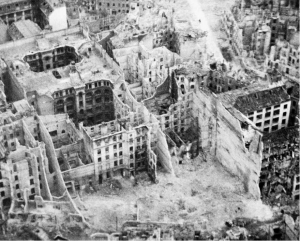The Fall of Berlin stands as a defining moment in World War II, symbolizing the ultimate defeat of Nazi Germany.

The Fall of Berlin: The Battle for Berlin, which led to the Fall of Berlin, unfolded in April 1945 as the Soviet Union launched a massive offensive against the German capital. Soviet troops, under the command of Marshal Georgy Zhukov, encircled Berlin, initiating a grueling street-by-street campaign. During the Fall of Berlin, the defenders of Berlin comprised a mixture of German regular army units, hastily trained Volkssturm militia, Hitler Youth, and even elderly men and boys.
As the Soviet forces closed in on Berlin, the city witnessed intense resistance from the German defenders. The battle reached a climax when, on April 30, 1945, Adolf Hitler, the leader of Nazi Germany, tragically took his own life in his Berlin bunker. Hitler’s suicide marked a symbolic end for the crumbling Nazi regime. Despite the loss of their leader, the German forces fought on tenaciously. However, by May 2, 1945, the Soviet troops had successfully encircled Berlin and launched a relentless assault on the city. General Helmuth Weidling, the German military commander in Berlin, made the decision to surrender to the Soviet forces on that fateful day. This was crucial in the fall of Berlin.
The Aftermath: The Fall of Berlin led to the unconditional surrender of all German forces on May 7, 1945, bringing an end to World War II in Europe. This historic event signaled the collapse of Nazi Germany and the downfall of Hitler’s reign of terror. The capture of Berlin also set the stage for the subsequent division of Germany into East Germany, under Soviet control, and West Germany, controlled by the United States, United Kingdom, and France. The Fall of Berlin holds immense historical significance. It marked the turning point in World War II, effectively ending the Nazi regime’s hold over Germany. Furthermore, the event paved the way for the division of Europe into opposing spheres of influence and the onset of the Cold War between the Soviet Union and the Western Allies. In terms of post-war developments, the Fall of Berlin had a profound impact. It fueled the formation of the United Nations and the subsequent establishment of the Universal Declaration of Human Rights, as the world sought to prevent a recurrence of the atrocities committed during the war. The division of Germany and the subsequent decades-long East-West conflict shaped the geopolitical landscape of the 20th century.
The Fall of Berlin stands as a defining moment in history, symbolizing the defeat of Nazi Germany and the end of Hitler’s reign. The battle itself was a testament to the courage and determination displayed by both the Soviet forces and the German defenders. The capture of Berlin not only brought about the conclusion of World War II in Europe but also set the stage for the subsequent division of Germany and the beginnings of the Cold War. The echoes of the Fall of Berlin continue to resonate, serving as a reminder of the horrors of war and the importance of seeking peace and unity in the face of adversity.
Cite This Article
"The Fall of Berlin: A Pivotal Moment in World War II History" History on the Net© 2000-2024, Salem Media.
July 27, 2024 <https://www.historyonthenet.com/the-fall-of-berlin-a-pivotal-moment-in-world-war-ii-history>
More Citation Information.





